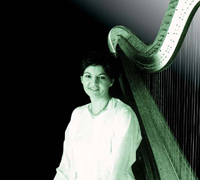
Greatest Persian Harpist Passes Away In AustriaJune 2, 2004 By Pejman Akbarzadeh Farzaneh Navai, the most prominent Persian harpist, who lived for many years in Austria, passed away a few days ago of cancer in a hospital in the city of Bregenz. She was 48.
Farzaneh Navai, the most prominent Persian harpist, who lived for many years in Austria, passed away a few days ago of cancer in a hospital in the city of Bregenz. She was 48.
This is in memory of her and in consolation with her sister and husband, Firoozeh Navai and Khosrow Soltani. A few months ago, when Farzaneh was hospitalized again for cancer, neither Khosrow nor Firoozeh nor I, nor any one of her friends and relatives permitted such thoughts to enter our minds. Up until the last moment, Farzaneh faced life with such an unbreakable spirit, such hope and such love... that it was she who would give us solace in the face of the tribulations of life. Today, for the first time, I am gripped with revulsion for my pen. Apparently, however, there is nothing to be done. To date, no article by her, or interview with her, has ever been published in Persian-language publications. I was one of the very few in Persia (Iran) who was in contact with her and her family... Thus, I shall speak of her and her noble art. Farzaneh Navai (Soltani) was born in 1956. In 1967, she began to study the harp (known to the Persians as "Chang") at the Tehran Conservatory of Music. Upon receiving her diploma, she went on a scholarship to Austria. For one year she taught the harp at the Tehran Conservatory and performed with the Tehran Symphony Orchestra, but for various reasons her residence in Iran was not to last. Upon marrying Khosrow Soltani, together they returned to Austria. The performance of the score for the play, "Lubiyayeh Sehramiz" (Magic Bean), which went on stage during Nowrouz 1359/March 1980, was among her joint performances with her husband in her homeland. After emigrating to Europe, the husband and wife were active in the music scene in Vienna and, in 1983, upon moving to the state of Vorarlberg in western Austria, they began to teach at various schools of music. Concurrent with her teaching, Farzaneh performed countless recitals and concerts with other Persian (Iranian) soloists who lived in that region and its neighboring states (such as Firoozeh Navai, Mehdi Djamei, Hossein Samieian and Said Taghaddosi). In the year 2000, two CDs of Farzaneh Navai were released in Europe, in which she has expertly performed works by Marcel Gerandjani and Camille Saint-Saens (harp solo), in addition to accompanying Saeed Taqaddosi (flute) and Khosrow Soltani (panpipes) in European folk and classical compositions. Her last performances appear in her husband's latest CD entitled, "Mahur-e Kabir", which was released in Europe. In this work, for the first time, Farzaneh attempted to perform Persian melodies on the Western harp. During the years following the 1979 revolution, Farzaneh studied the tar and Persian classical music with Houshang Zarif, who had taken up residence in Vienna. In this work she attempted to blend what she had learned from both Persian and Western music. Farzaneh has left two talented children, Kian and Sara. YAADASH GERAAMI English Translation by Ali Mehran BBC Persian Article  Front Page Front Page |